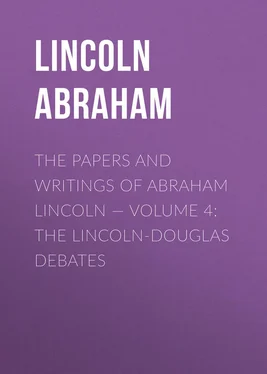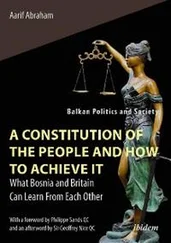Abraham Lincoln - The Papers And Writings Of Abraham Lincoln — Volume 4 - The Lincoln-Douglas Debates
Здесь есть возможность читать онлайн «Abraham Lincoln - The Papers And Writings Of Abraham Lincoln — Volume 4 - The Lincoln-Douglas Debates» — ознакомительный отрывок электронной книги совершенно бесплатно, а после прочтения отрывка купить полную версию. В некоторых случаях можно слушать аудио, скачать через торрент в формате fb2 и присутствует краткое содержание. Жанр: foreign_antique, foreign_prose, на английском языке. Описание произведения, (предисловие) а так же отзывы посетителей доступны на портале библиотеки ЛибКат.
- Название:The Papers And Writings Of Abraham Lincoln — Volume 4: The Lincoln-Douglas Debates
- Автор:
- Жанр:
- Год:неизвестен
- ISBN:нет данных
- Рейтинг книги:3 / 5. Голосов: 1
-
Избранное:Добавить в избранное
- Отзывы:
-
Ваша оценка:
- 60
- 1
- 2
- 3
- 4
- 5
The Papers And Writings Of Abraham Lincoln — Volume 4: The Lincoln-Douglas Debates: краткое содержание, описание и аннотация
Предлагаем к чтению аннотацию, описание, краткое содержание или предисловие (зависит от того, что написал сам автор книги «The Papers And Writings Of Abraham Lincoln — Volume 4: The Lincoln-Douglas Debates»). Если вы не нашли необходимую информацию о книге — напишите в комментариях, мы постараемся отыскать её.
The Papers And Writings Of Abraham Lincoln — Volume 4: The Lincoln-Douglas Debates — читать онлайн ознакомительный отрывок
Ниже представлен текст книги, разбитый по страницам. Система сохранения места последней прочитанной страницы, позволяет с удобством читать онлайн бесплатно книгу «The Papers And Writings Of Abraham Lincoln — Volume 4: The Lincoln-Douglas Debates», без необходимости каждый раз заново искать на чём Вы остановились. Поставьте закладку, и сможете в любой момент перейти на страницу, на которой закончили чтение.
Интервал:
Закладка:
[Mr. JAMES BROWN (Douglas postmaster): "What does Ford's History say about him?"]
Some gentleman asks me what Ford's History says about him. My own recollection is that Ford speaks of Trumbull in very disrespectful terms in several portions of his book, and that he talks a great deal worse of Judge Douglas. I refer you, sir, to the History for examination.
Judge Douglas complains at considerable length about a disposition on the part of Trumbull and myself to attack him personally. I want to attend to that suggestion a moment. I don't want to be unjustly accused of dealing illiberally or unfairly with an adversary, either in court or in a political canvass or anywhere else. I would despise myself if I supposed myself ready to deal less liberally with an adversary than I was willing to be treated myself. Judge Douglas in a general way, without putting it in a direct shape, revives the old charge against me in reference to the Mexican War. He does not take the responsibility of putting it in a very definite form, but makes a general reference to it. That charge is more than ten years old. He complains of Trumbull and myself because he says we bring charges against him one or two years old. He knows, too, that in regard to the Mexican War story the more respectable papers of his own party throughout the State have been compelled to take it back and acknowledge that it was a lie.
[Here Mr. LINCOLN turned to the crowd on the platform, and, selecting HON. ORLANDO B. FICKLIN, led him forward and said:]
I do not mean to do anything with Mr. FICKLIN except to present his face and tell you that he personally knows it to be a lie! He was a member of Congress at the only time I was in Congress, and [FICKLIN] knows that whenever there was an attempt to procure a vote of mine which would indorse the origin and justice of the war, I refused to give such indorsement and voted against it; but I never voted against the supplies for the army, and he knows, as well as Judge Douglas, that whenever a dollar was asked by way of compensation or otherwise for the benefit of the soldiers I gave all the votes that FICKLIN or Douglas did, and perhaps more.
[Mr. FICKLIN: My friends, I wish to say this in reference to the matter: Mr. Lincoln and myself are just as good personal friends as Judge Douglas and myself. In reference to this Mexican War, my recollection is that when Ashmun's resolution [amendment] was offered by Mr. Ashmun of Massachusetts, in which he declared that the Mexican War was unnecessary and unconstitutionally commenced by the President-my recollection is that Mr. Lincoln voted for that resolution.]
That is the truth. Now, you all remember that was a resolution censuring the President for the manner in which the war was begun. You know they have charged that I voted against the supplies, by which I starved the soldiers who were out fighting the battles of their country. I say that FICKLIN knows it is false. When that charge was brought forward by the Chicago Times, the Springfield Register [Douglas's organ] reminded the Times that the charge really applied to John Henry; and I do know that John Henry is now making speeches and fiercely battling for Judge Douglas. If the Judge now says that he offers this as a sort of setoff to what I said to-day in reference to Trumbull's charge, then I remind him that he made this charge before I said a word about Trumbull's. He brought this forward at Ottawa, the first time we met face to face; and in the opening speech that Judge Douglas made he attacked me in regard to a matter ten years old. Is n't he a pretty man to be whining about people making charges against him only two years old!
The Judge thinks it is altogether wrong that I should have dwelt upon this charge of Trumbull's at all. I gave the apology for doing so in my opening speech. Perhaps it did n't fix your attention. I said that when Judge Douglas was speaking at place — where I spoke on the succeeding day he used very harsh language about this charge. Two or three times afterward I said I had confidence in Judge Trumbull's veracity and intelligence; and my own opinion was, from what I knew of the character of Judge Trumbull, that he would vindicate his position and prove whatever he had stated to be true. This I repeated two or three times; and then I dropped it, without saying anything more on the subject for weeks — perhaps a month. I passed it by without noticing it at all till I found, at Jacksonville, Judge Douglas in the plenitude of his power is not willing to answer Trumbull and let me alone, but he comes out there and uses this language: "He should not hereafter occupy his time in refuting such charges made by Trumbull but that, Lincoln having indorsed the character of Trumbull for veracity, he should hold him [Lincoln] responsible for the slanders." What was Lincoln to do? Did he not do right, when he had the fit opportunity of meeting Judge Douglas here, to tell him he was ready for the responsibility? I ask a candid audience whether in doing thus Judge Douglas was not the assailant rather than I? Here I meet him face to face, and say I am ready to take the responsibility, so far as it rests on me.
Having done so I ask the attention of this audience to the question whether I have succeeded in sustaining the charge, and whether Judge Douglas has at all succeeded in rebutting it? You all heard me call upon him to say which of these pieces of evidence was a forgery. Does he say that what I present here as a copy of the original Toombs bill is a forgery? Does he say that what I present as a copy of the bill reported by himself is a forgery, or what is presented as a transcript from the Globe of the quotations from Bigler's speech is a forgery? Does he say the quotations from his own speech are forgeries? Does he say this transcript from Trumbull's speech is a forgery?
["He didn't deny one of them."]
I would then like to know how it comes about that when each piece of a story is true the whole story turns out false. I take it these people have some sense; they see plainly that Judge Douglas is playing cuttle-fish, a small species of fish that has no mode of defending itself when pursued except by throwing out a black fluid, which makes the water so dark the enemy cannot see it, and thus it escapes. Ain't the Judge playing the cuttle-fish?
Конец ознакомительного фрагмента.
Текст предоставлен ООО «ЛитРес».
Прочитайте эту книгу целиком, купив полную легальную версию на ЛитРес.
Безопасно оплатить книгу можно банковской картой Visa, MasterCard, Maestro, со счета мобильного телефона, с платежного терминала, в салоне МТС или Связной, через PayPal, WebMoney, Яндекс.Деньги, QIWI Кошелек, бонусными картами или другим удобным Вам способом.
Интервал:
Закладка:
Похожие книги на «The Papers And Writings Of Abraham Lincoln — Volume 4: The Lincoln-Douglas Debates»
Представляем Вашему вниманию похожие книги на «The Papers And Writings Of Abraham Lincoln — Volume 4: The Lincoln-Douglas Debates» списком для выбора. Мы отобрали схожую по названию и смыслу литературу в надежде предоставить читателям больше вариантов отыскать новые, интересные, ещё непрочитанные произведения.
Обсуждение, отзывы о книге «The Papers And Writings Of Abraham Lincoln — Volume 4: The Lincoln-Douglas Debates» и просто собственные мнения читателей. Оставьте ваши комментарии, напишите, что Вы думаете о произведении, его смысле или главных героях. Укажите что конкретно понравилось, а что нет, и почему Вы так считаете.












